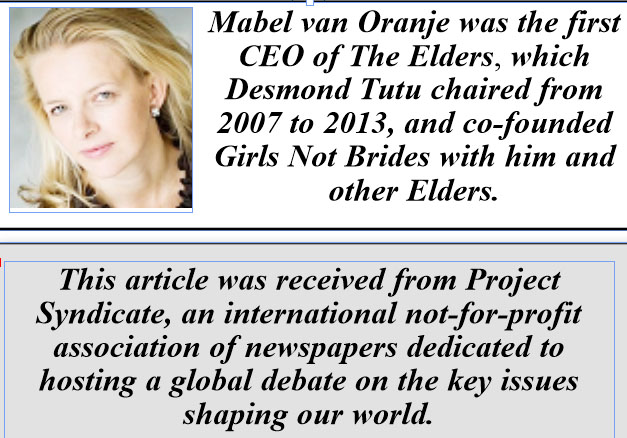By Mabel van Oranje
LONDON – With the passing of Archbishop Desmond Tutu, the world has lost an unstoppable force for good who taught compassion and forgiveness, and pursued his mission with a will of iron.
“Arch” will be rightly remembered as the international voice of the anti-apartheid movement and for his place beside Nelson Mandela in the decades-long fight for racial equality and justice in South Africa. But he touched people’s lives in so many other ways.
In particular, I want to acknowledge his contribution to global efforts to end child marriage. His involvement began with another of his great qualities: the humility to admit what he did not know. I remember the moment when he learned that child marriage rates in Sub-Saharan Africa were as high or higher than in South Asia or the Middle East. “I didn’t think this was an African thing,” he said to me frankly.
But once he knew, he became fully committed to the cause. Already almost 80 years old, he willingly traveled to remote villages in Ethiopia, India, and Zambia to meet and listen to adolescent girls who were married or under pressure to marry. He met their fathers, faith leaders, village elders, and politicians to learn why this was happening and tried to convince them that marriage was not in the girls’ best interests.
He was never afraid to take on the establishment – religious, cultural, or political. He was a brilliant communicator and wily campaigner who could make audiences laugh and cry within minutes. He knew how to press the right emotional buttons and convey difficult messages, often using stories to get his point across. While traveling with him, it was not unusual to see leaders, including presidents and prime ministers, listening like children to one of his stories, then realizing that the point of the tale was directed squarely at them.
If he bore witness to injustice, he made sure those in power knew about it. He spoke not only about the suffering of girls forced into marriage, but also about men’s role in ending this harmful practice. He spoke of the changes he had witnessed when men started treating their wives as equals: “They actually told me they liked doing housework and taking care of their children!” But he tempered harsh truths with such compassion and good humour that he was welcomed by leaders of all faiths and none. He was very hard to resist when he set his mind to something.
But while Arch was a man of steely determination, he always made people feel valued. He would stop to speak to those who served tea or opened doors for him, more than once making a president wait. I am sure he was making a point to the great men (they were almost always men): everyone deserves respect and equal treatment. He loved meeting young people and gave them enormous encouragement and hope. He often used to say that creating big change requires a big wave. Each of us can be a drop of water constituting that wave, and by working together we can achieve great things.
Forgiveness of others, and of ourselves, was one of his most-repeated messages. As Chair of The Elders, a group of global leaders that he, together with Mandela and Graça Machel, established in 2007, he reminded his distinguished peers of our shared humanity and interconnectedness – ensuring that the work of the group remained focused on justice and those most in need of help.
As a friend, he was deeply loyal. I will always be grateful for the comfort and counsel he gave me when my husband was severely injured. Arch called me every day in the long months while Friso was unconscious. Sometimes we spoke for hours, and sometimes just for a few minutes. But he made it clear that he was always there for me.
It is impossible to say everything there is to say about this tough, funny, brilliant giant of social justice. I will try to remember him by taking small actions every day to make a difference, and by upholding his belief that goodness will ultimately triumph in this troubled world.
Copyright: Project Syndicate, 2021.

